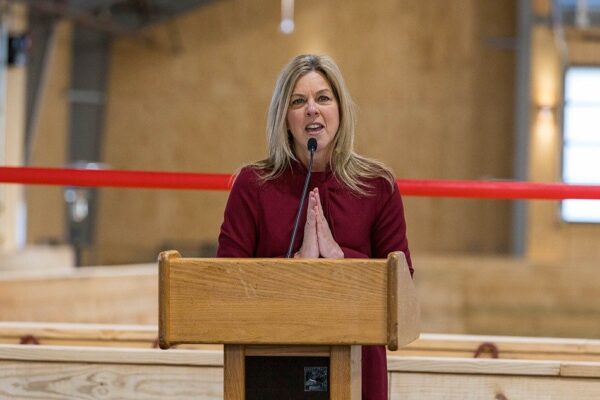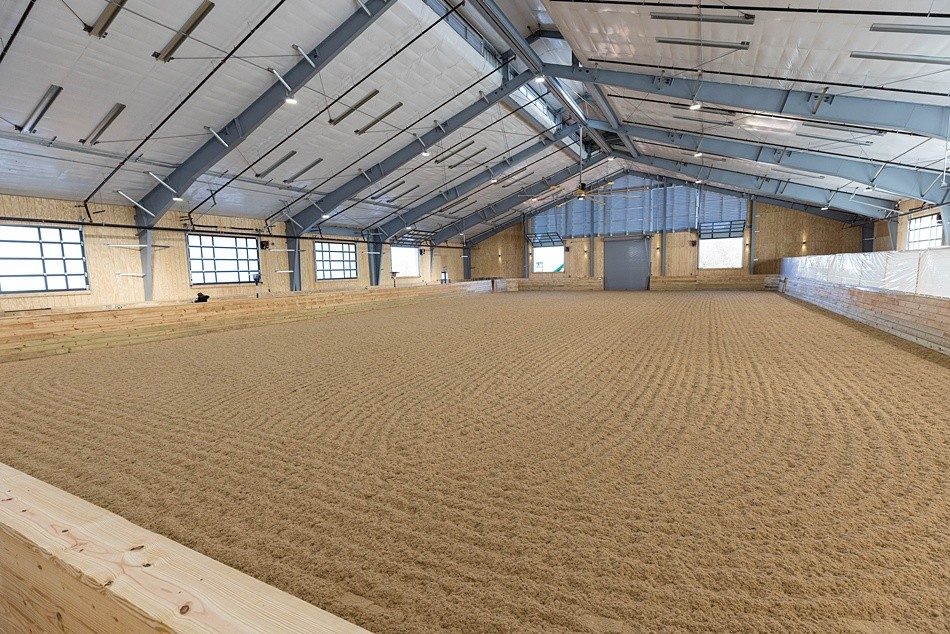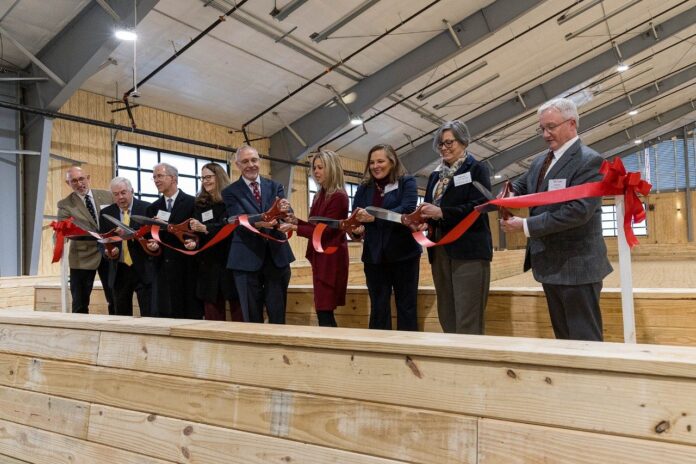Virginia Tech cut the ribbon on a holiday season gift for Northern Virginia and horse enthusiasts across the mid-Atlantic region on Tuesday.
Virginia first lady Suzanne Youngkin joined Executive Vice President and Provost Cyril Clarke and other Virginia Tech officials at the ribbon-cutting for the Jane and Stephen Hale Equine Performance Evaluation Center and the official naming of the Paul J. Goodness Podiatry Clinic at the Marion duPont Scott Equine Medical Center in Leesburg. The Equine Medical Center is one of three teaching hospitals of the Virginia-Maryland College of Veterinary Medicine.
“I could go on and on about what this facility means not only to Virginia Tech, but to the Commonwealth of Virginia,” said Youngkin, a medical center client and supporter before her husband, Glenn, was elected governor in 2021. “I am thrilled that the commonwealth can stand very proudly in having such exemplary service not only for its citizens, but for its equines.”
“This is a premier equine clinical unit dedicated to high-end medical and surgical treatment of horses that provides an opportunity to educate veterinary medical students, residents, and interns in the context of experiential learning,” said Clarke, a former dean of the veterinary college. “Additionally, we have an opportunity to connect some truly interesting and impactful translational research. And to do that, in the midst of Virginia horse country, that is quite an achievement.”
The new facility, built by Scott-Long Construction of Chantilly, Virginia, has about 21,000 square feet of floor area. The indoor arena includes a riding area for under-saddle diagnostics, two jogging strips, and two lunging areas. The riding area has Attwood Equestrians Pinnacle surface, a soft synthetic, dust free footing. One jogging strip and one lunging area have an asphalt surface while the other jogging strip and lunging area have Padenpor seamless soft surface by Abacus.
“In 2015, more than eight years ago, we began developing a vision to take sports medicine at the Equine Medical Center to the next level,” said Michael Erskine, the center’s director. “It called for a comprehensive and multidisciplinary approach to the equine athlete and involved enhancing and integrating sports medicine with surgery, internal medicine, podiatry, and advanced imaging. And it required the creation of a shared physical infrastructure to support it.”
The three surfaces are necessary to help clinicians better understand and diagnose how horses are affected by various injuries or lameness as they move, said Jennifer Barrett, Theodora Ayer Randolph Professor of Equine Surgery.
“When horses are jogging on asphalt, that gives more of a concussive force and can make subtle, weight-bearing lameness more obvious, easier to detect,” Barrett said. “Horses will show lameness differently on the rubber flooring, and then using the soft surface will help us to tell if it’s worse there. It could be a tendon or ligament injury.
“The most important thing is having an arena where ridden exams can be performed,” Barrett said. “Horses need to be under saddle for certain types of evaluation. And we really haven’t had a safe location for that. We need this for when there’s a subtle lameness or lameness that only occurs under saddle in certain conditions.”
 Jane and Stephen Hale were long-term clients of the Equine Medical Center and for 40 years owned and operated an equine facility in Lovettsville, Virginia. They often showed and competed in hunter jumper classes, with Stephen Hale once placing fourth in a national competition at Madison Square Garden in New York.
Jane and Stephen Hale were long-term clients of the Equine Medical Center and for 40 years owned and operated an equine facility in Lovettsville, Virginia. They often showed and competed in hunter jumper classes, with Stephen Hale once placing fourth in a national competition at Madison Square Garden in New York.
As trustee of the Hales estate, Joe T. May embraced the opportunity to name a significant equine diagnostic facility after the Hales.
“This tremendous facility that we are standing in has been made possible by the philanthropic support of generous donors who desired to benefit equine athletes, equine companions, and their owners,” said M. Daniel Givens, dean of the veterinary college. “This facility will provide a great environment for horses and for faculty, staff, residents, interns, and students who are providing service to those horses, and also for the clients that bring those horses in. While the horses who will benefit from this facility are yet to enter the doors, it’s a real privilege to have each of you here today as we celebrate this ribbon-cutting.”
Aimee and Frank Batten provided the initial challenge gift to build the new indoor arena. Karen Jones Squires and James Squires made a significant gift when the costs of the performance center exceeded initial estimates. Many other donors also contributed to the project.
The Youngkins donated funds to construct covered walkways from the new arena to the existing Youngkin Equine Soundness Clinic and the newly renamed Paul J. Goodness Podiatry Center.
Goodness, a certified journeyman farrier, founded Northern Virginia’s first group farrier practice and referral therapeutic farrier clinic with a partner in 1990. Their practice quickly became a mecca for challenging podiatry cases with owners shipping horses from all over the East Coast. Goodness served as the official United States Equestrian Team Farrier from 1992-96, acting as team farrier for the 1996 Olympic Games in Atlanta, Georgia.
Beginning in the late 1990s, Goodness collaborated on a part-time basis with Equine Medical Center faculty to shoe and treat horses with chronic foot issues. Goodness died in 2020. The horse podiatry center was officially renamed for Goodness on Tuesday.
Suzanne Youngkin recalled warmly how Goodness helped her with her Canadian warmblood horse Pete and also the humanity Goodness showed that lived up to his last name.

“Paul Goodness’ spirit is going to be here,” Youngkin said. “It’s a spirit of goodness. It’s a spirit of humility. It’s a spirit of caring. And it’s a spirit of health and wellness. And I think that’s what we’re celebrating here today, this special spirit of loving equines, of serving one another and of serving these horses, which means so much to us.”
The Marion duPont Scott Equine Medical Center was created in 1984 through a $4 million gift from the late Marion duPont Scott. The Westmoreland Davis Memorial Foundation donated 200 acres at Morven Park and contributions from the private sector enabled the initial equipment purchases.
Located in the heart of Virginia horse country, the medical center has become a premier, full-service equine hospital that offers comprehensive specialty care, 24-hour emergency treatment, and diagnostic services for all ages and breeds of horses. The medical center now sees more than 2,400 patients annually and has a renewed focus on emergency and critical care, sports medicine, regenerative medicine, and neonatal services.

